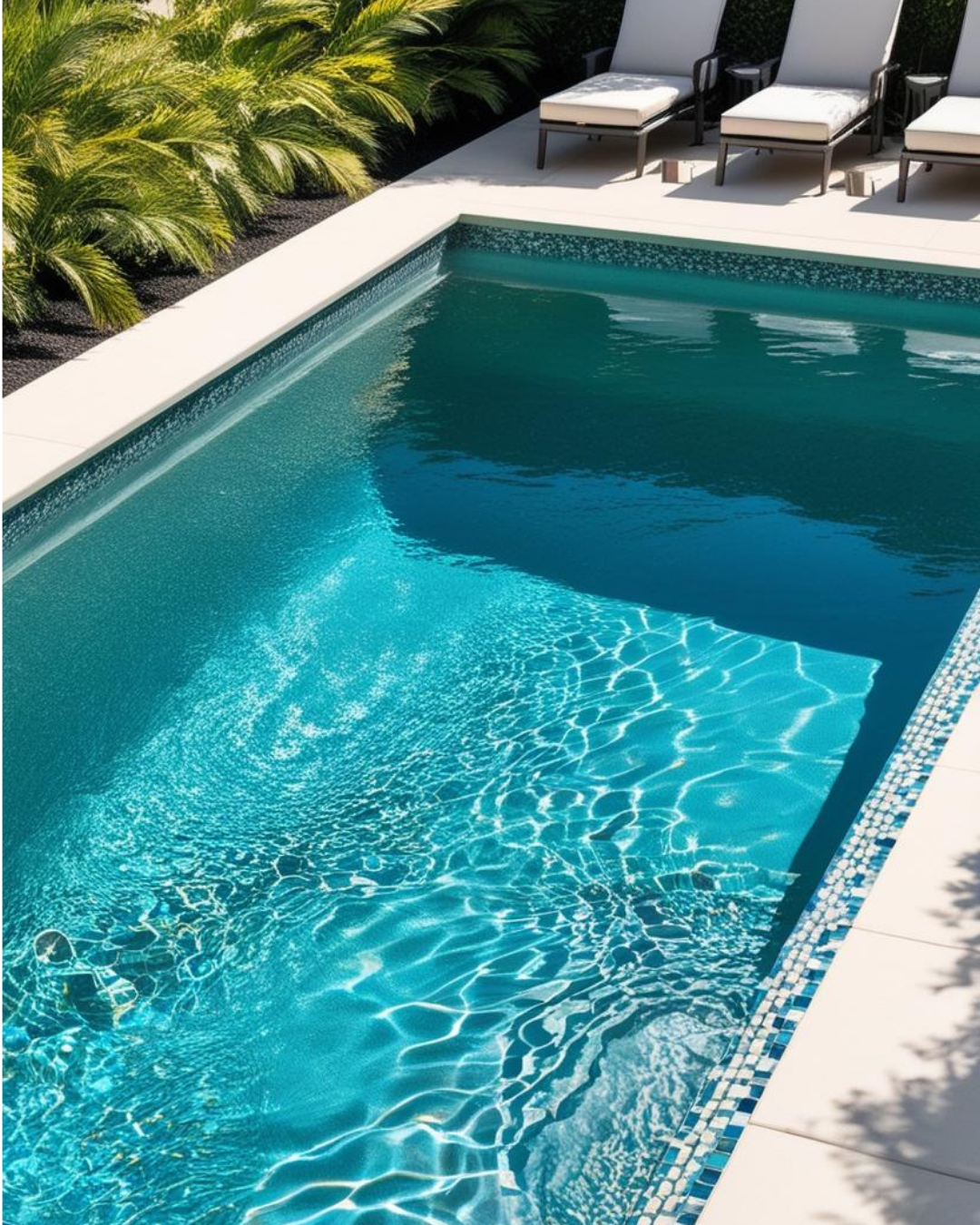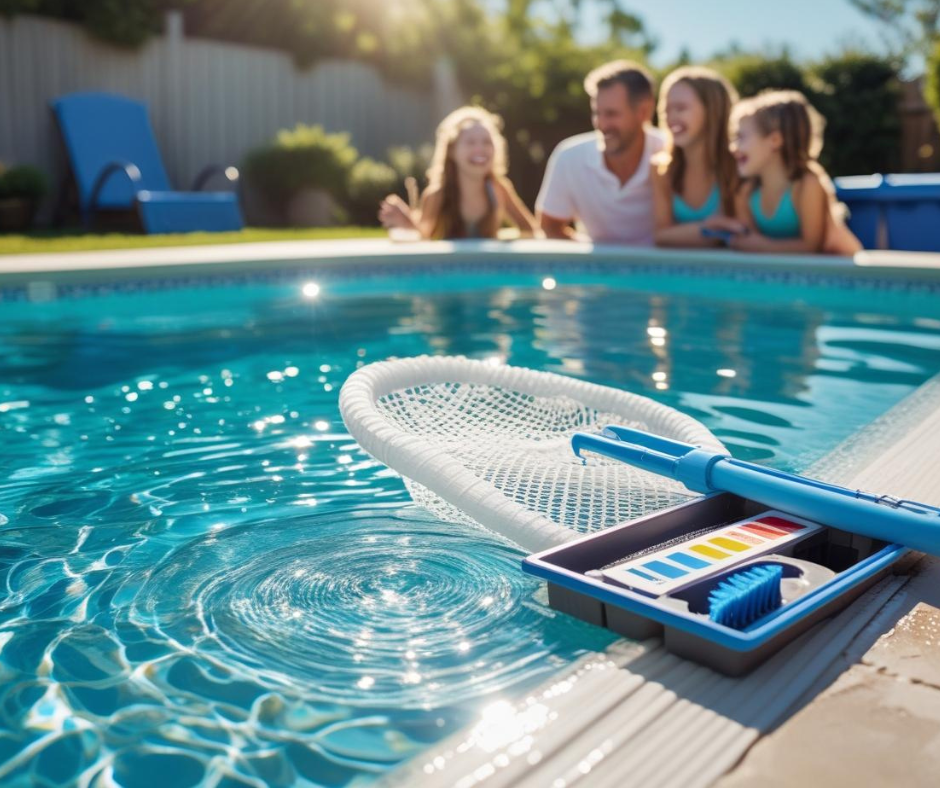Owning a swimming pool in Texas is a luxury — but maintaining it shouldn’t mean turning your water into a chemical soup. Many pool owners mistakenly believe that “the more chlorine, the better,” when in fact, overusing pool chemicals can cause irritation, equipment damage, and even make your pool less safe.
At Firefighter Pools, we believe the best water is balanced, not overloaded. In this blog, you’ll learn how to maintain crystal-clear, healthy water using fewer chemicals — and smarter practices.

Schedule Your Pool Service Today
Why Overusing Chemicals Backfires
It’s tempting to keep adding chlorine when water gets cloudy or smells strong — but too much of it causes more harm than good. Some of the most common problems include:
- Red, irritated eyes and dry skin
- Chemical burns or rashes from high chlorine levels
- Strong odors that make swimming unpleasant
- Corrosion of pool surfaces, ladders, and pumps
- Imbalanced pH, which can make chlorine ineffective
Too many chemicals also raise your monthly pool costs and reduce your pool’s lifespan. The key to a safe, comfortable pool? Precision — not excess.
Pool Chemistry 101: The Balancing Act
To reduce chemical use, you need to master the basics of water chemistry. These core parameters must stay within safe ranges to avoid problems:
1. pH Levels
- Ideal: 7.2–7.6
- If too low: Water becomes acidic and corrodes metal
- If too high: Chlorine becomes ineffective, and scale can form
2. Chlorine Levels
- Ideal: 1–3 ppm
- Chlorine sanitizes water but overuse causes skin/eye issues and chemical smell
3. Total Alkalinity
- Ideal: 80–120 ppm
- Acts as a pH buffer; keeps levels steady
4. Calcium Hardness
- Ideal: 200–400 ppm
- Prevents surface damage and plaster erosion
Not confident testing your own water? Our expert service technicians handle chemical balancing during every visit — with zero guesswork.
Smart, Natural Ways to Reduce Pool Chemicals
Here are practical steps to reduce your reliance on chlorine and other chemicals — while keeping your pool water safe and sparkling.
1. Improve Filtration Efficiency
Filtration removes physical debris, bacteria, and oils from the water — lowering the chemical load.
Best practices:
- Run your pump for at least 8 hours daily
- Backwash your filter weekly
- Clean cartridge filters monthly
- Inspect your system for leaks or clogged pipes
Need a system check? Book a filter inspection
2. Keep the Pool Clean — Physically
Don’t let dirt and debris sit — it feeds algae and bacteria. Consistent cleaning helps you stay ahead.
Tips:
- Brush the pool walls twice a week
- Vacuum the floor at least once weekly
- Skim the surface daily if your pool is surrounded by trees
Use a robotic cleaner to reduce manual effort and help with circulation.
3. Use Enzyme Treatments
Enzymes break down oils, lotions, and organic waste that chlorine usually targets. That means less chlorine is needed to maintain clarity.
- Great for pools with heavy use
- Reduces scum lines and cloudy water
- Compatible with chlorine and saltwater systems
4. Maintain Proper Circulation
Dead spots in your pool (corners, steps) lead to algae growth and chemical inconsistencies. Ensure all water gets circulated through the filter.
Quick tips:
- Check pump flow rate and return jets
- Run the pump during warmest hours (10 AM–6 PM)
- Add wall return eyeballs to redirect flow into dead zones
5. Use a Pool Cover Daily
A good pool cover is one of the easiest ways to reduce chemical usage.
Benefits:
- Reduces evaporation by up to 95%
- Blocks UV rays, slowing chlorine breakdown
- Keeps out leaves, bugs, and debris
- Retains heat and reduces energy costs
6. Shock the Pool… Smartly
Shocking is essential — but don’t overdo it. Use non-chlorine shock after heavy use, storms, or when water looks dull. Always test water first.
When Chemicals Fail, It Might Be Your Equipment
Chemical imbalance is sometimes a symptom, not the cause.
Faulty pumps, broken chlorinators, or poor plumbing can cause cloudy water, algae, and chemical waste. If your pool constantly requires more chlorine or pH adjusting, it may be time for an equipment check.
Firefighter Pools’ repair specialists inspect and maintain filters, pumps, salt cells, and more — helping you fix root problems and save money.
What Sets Firefighter Pools Apart?
We’re more than just cleaners — we’re first responders and certified pool professionals who know how to protect your family and property.
Here’s what our customers love:
- Expert chemical balancing on every visit
- Photo confirmation of completed services
- Transparent communication
- Safety-first approach — no shortcuts
Check out our customers’ reviews to see what local families say.
Frequently Asked Questions
Is it safe to swim in a pool with low chlorine?
No — swimming in a pool with low chlorine levels is not safe.
Chlorine is the primary disinfectant used in pools to eliminate harmful pathogens like E. coli, Giardia, and Cryptosporidium. According to the CDC, chlorine levels should be maintained between 1–3 ppm (parts per million) to effectively sanitize pool water.
When chlorine falls below 1 ppm, the water may look clear but can quickly become a breeding ground for bacteria and algae. Swimmers risk skin infections, eye irritation, and even gastrointestinal illnesses.
Low chlorine is a common issue — but the solution isn’t to overcorrect with harsh chemical shocks. The key is consistent, accurate balancing. At Firefighter Pools, our technicians use professional-grade testing equipment to maintain ideal water chemistry, so you can swim with confidence year-round.
See our pool cleaning and water balancing services
Can saltwater pools reduce chlorine use?
Yes — saltwater pools reduce the need for manually adding chlorine, but they still rely on chlorine for sanitation.
Saltwater systems use electrolysis to convert dissolved salt into chlorine, which is then circulated into your pool water to disinfect it. The process is more controlled and continuous compared to traditional chlorine dosing.
Here are key benefits of saltwater systems:
- Lower chemical odor
- Gentler on eyes, skin, and swimsuits
- No need to handle or store liquid chlorine or tablets
- Lower long-term chemical costs
However, saltwater pools still require chemical monitoring, periodic shock treatments, and proper equipment maintenance. Salt cells and generators can wear out and need expert calibration — all services Firefighter Pools provides.
What’s the best way to test my pool water?
The best way to test pool water is with regular, accurate methods — and support from a pool professional.
Here’s a tiered approach:
- Weekly Testing:
Use test strips to check chlorine, pH, and alkalinity. These are quick but may lack precision. - Monthly Testing:
A digital test kit offers more detailed readings including stabilizer (CYA), calcium hardness, and TDS (total dissolved solids). - Professional Testing:
Firefighter Pools includes water testing and chemical balancing as part of every cleaning visit. We test more variables and adjust based on real-world usage, not just textbook ranges — which results in safer, more comfortable water.
Want safer, balanced water — without the guesswork?
If you’re dealing with cloudy water, strong chlorine odors, irritated skin, or equipment corrosion, chances are your chemical balance is off. Don’t leave water care to chance — or rely on one-size-fits-all kits.
Firefighter Pools offers year-round pool maintenance tailored to the needs of Texas homeowners. We provide:
- Weekly or one-time cleanings
- Expert chemical balancing
- Equipment inspections and repairs
- Professional-grade results with photo proof
You deserve a pool that looks great and feels even better.Book your cleaning or water treatment service now
Resources






